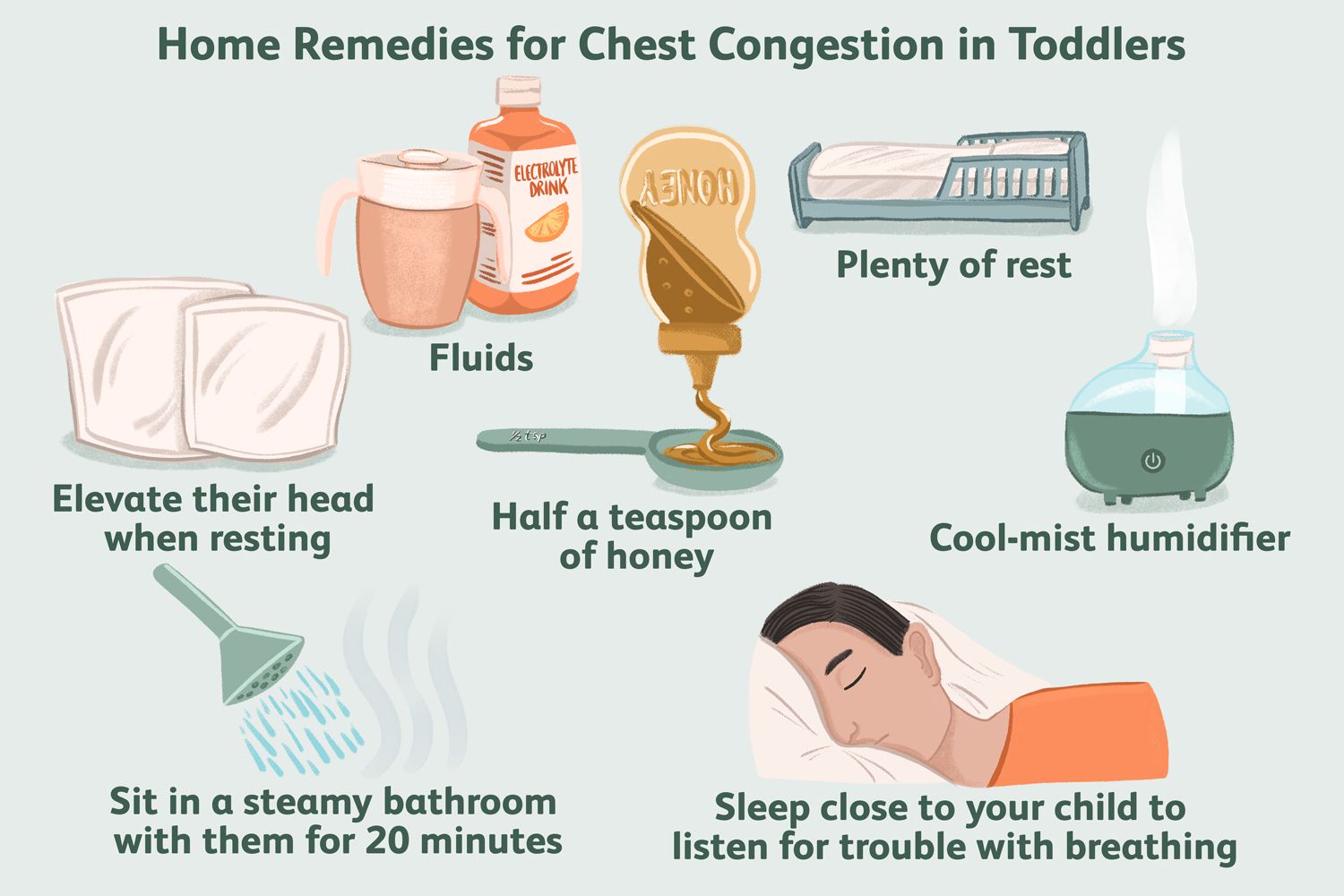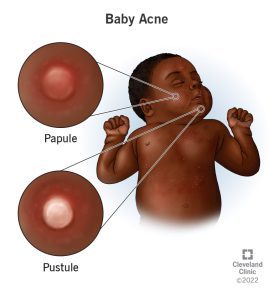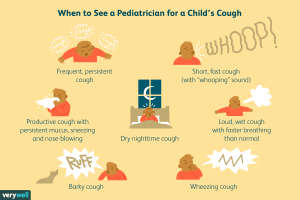To get rid of baby chest congestion, use a humidifier and elevate the baby’s head during sleep. Chest congestion in babies can be distressing for both the baby and the parents.
It is characterized by a build-up of mucus in the chest, making it difficult for the baby to breathe comfortably. Fortunately, there are simple yet effective ways to alleviate baby chest congestion. This article will explore various methods to help your little one find relief from this discomfort.
From the use of a humidifier to elevating the baby’s head during sleep, these strategies can help clear the airways and promote easier breathing. By following these tips, you can help your baby feel better and breathe easier in no time.
Understanding Baby Chest Congestion
As a parent, it can be distressing to see your baby struggling with chest congestion. Understanding the causes and symptoms of this common condition can help you take appropriate measures to provide relief to your little one. Baby chest congestion occurs when the airways in the lungs become blocked or inflamed, making it difficult for your baby to breathe properly. In this article, we will explore the common causes of baby chest congestion and the symptoms you should look out for.
Common Causes Of Chest Congestion
Baby chest congestion can be caused by various factors, including:
- Common cold or flu: Viral infections are a leading cause of chest congestion in babies. When your baby catches a cold or the flu, the mucus production increases, leading to congestion.
- Respiratory syncytial virus (RSV): RSV is a highly contagious virus that commonly affects infants and young children. It can cause severe chest congestion and lead to more serious respiratory problems.
- Allergies: Some babies may develop chest congestion as a result of allergic reactions to dust, pollen, pet dander, or certain foods. Allergies can trigger inflammation in the airways, causing congestion.
- Asthma: Although rare in infants, asthma can also contribute to baby chest congestion. Asthma causes swelling and narrowing of the airways, leading to difficulty in breathing.
- Environmental irritants: Exposure to pollutants, cigarette smoke, or other irritants can irritate your baby’s airways and lead to chest congestion.
Symptoms To Look Out For
It’s important to be aware of the following symptoms which may indicate baby chest congestion:
- Coughing: Your baby may have a persistent, dry or wet cough as a result of chest congestion.
- Wheezing: Wheezing is a high-pitched whistling sound that can occur when your baby exhales, indicating narrowed airways.
- Rapid breathing: If your baby is breathing more rapidly than usual or showing signs of shallow breathing, it may be a sign of chest congestion.
- Nasal congestion: Along with chest congestion, your baby may also have a stuffy or runny nose.
- Difficulty feeding: Chest congestion can make it hard for your baby to suck and swallow, leading to fussiness during feedings.
If you notice any of these symptoms in your baby, it is crucial to consult a healthcare professional for proper diagnosis and guidance. Understanding baby chest congestion and being proactive in addressing it can help your little one breathe easier and recover quickly.
Home Remedies For Baby Chest Congestion
Steam Inhalation
Boldly place a few drops of eucalyptus oil into a hot bath, close the bathroom door, and sit in the steamy room with your baby for 10-15 minutes. The warm steam helps to loosen the mucus built up in your baby’s chest, making it easier for them to cough it up.
Elevating Baby’s Head While Sleeping
Use extra pillows or a wedge pillow under the mattress to elevate your baby’s head while they sleep. This position helps to drain mucus away from the chest and reduces congestion.
Using A Humidifier
Introduce a cool mist humidifier in your baby’s room to keep the air moist. The increased moisture can help in thinning the mucus, making it easier for your baby to breathe and reducing chest congestion.
Natural Remedies For Baby Chest Congestion
When your baby is suffering from chest congestion, it can be a distressing time for both you and your little one. While seeking medical advice is always recommended, there are several natural remedies that can help provide relief and ease their discomfort. These remedies are safe to use and can be effective in reducing chest congestion. Here are some of the natural remedies you can try:
Breast Milk
Breast milk is not only the perfect food for your baby’s overall health, but it can also work wonders when it comes to chest congestion. This natural remedy is known for its immune-boosting properties and can help relieve congestion by breaking up mucus. You can gently warm some breast milk and feed it to your baby. The antibodies and enzymes present in breast milk can help fight off any infection causing the congestion and provide relief.
Saline Nasal Drops
Saline nasal drops are another effective natural remedy for relieving baby chest congestion. These drops help in reducing nasal congestion, loosening mucus, and making it easier for your baby to breathe. To use saline nasal drops, tilt your baby’s head back slightly and gently squeeze a few drops into their nostrils. Wait for a few minutes and then use a bulb syringe or a nasal aspirator to remove the mucus.
Eucalyptus Oil, Get Rid of Baby Chest Congestion
Eucalyptus oil is a popular natural remedy that can provide relief from chest congestion. Its decongestant properties can help open up your baby’s airways and make breathing easier. To use eucalyptus oil, mix a few drops with a carrier oil, such as coconut or olive oil. Gently massage the mixture onto your baby’s chest and back. The soothing aroma of eucalyptus can clear the congestion and provide comfort to your little one.
Remember, when using any natural remedy, it’s essential to consult with your baby’s pediatrician and ensure they are suitable for your baby’s age and health condition. These natural remedies can be effective in providing relief from baby chest congestion, but if your baby’s symptoms worsen or persist, seek medical attention immediately. With proper care and the right remedies, you can help your baby breathe a little easier and alleviate their discomfort.
:max_bytes(150000):strip_icc()/GettyImages-1136031918-8f3521aca76347dcba540a37f63e62a0.jpg)
Medical Treatments For Baby Chest Congestion
To ease baby chest congestion, natural remedies like steam inhalation and gentle chest massages can help. Using a cool-mist humidifier and ensuring proper hydration can also provide relief. If symptoms persist, seeking medical advice is crucial for accurate diagnosis and treatment.
Medical Treatments for Baby Chest Congestion When your baby is suffering from chest congestion, it’s essential to know about the medical treatments that can provide relief. From utilizing a nasal aspirator to seeking medications prescribed by a pediatrician, there are various options to consider.
Nasal Aspirator, Get Rid of Baby Chest Congestion
Using a nasal aspirator can effectively help in clearing the mucus from your baby’s congested chest. This device works by gently suctioning out the nasal secretions, providing much-needed relief to your little one. Make sure to choose a soft and flexible nasal aspirator to prevent any discomfort for your baby during the process.
Medication Prescribed By A Pediatrician
When natural remedies and home care fail to alleviate your baby’s chest congestion, seeking medication prescribed by a pediatrician becomes necessary. Your pediatrician may recommend over-the-counter or prescription medications tailored to your baby’s specific condition. These medications can help reduce inflammation, relieve coughing, and thin out mucus, ultimately aiding in clearing the chest congestion. In summary, utilizing a nasal aspirator and seeking medication prescribed by a pediatrician are crucial medical treatments for addressing and alleviating baby chest congestion. It’s essential to consult with a healthcare professional before pursuing any medical treatments to ensure the best approach for your baby’s well-being.
Preventing Baby Chest Congestion, Get Rid of Baby Chest Congestion
Learn effective ways to prevent and treat baby chest congestion with these simple tips and remedies. Keep your little one comfortable and healthy by implementing helpful techniques to clear their airways.
Preventing Baby Chest Congestion Proper Hydration Keep baby hydrated with frequent feedings to loosen chest mucus. Regularly Cleaning Baby’s Environment Dust and vacuum baby’s surroundings to reduce irritants causing congestion.

When To Consult A Doctor, Get Rid of Baby Chest Congestion
When your baby experiences chest congestion, it’s essential to consult a doctor for proper treatment. Seeking medical advice early can help alleviate discomfort and prevent any complications. A healthcare professional can provide guidance on the most effective ways to relieve your baby’s symptoms.
When to Consult a Doctor: If symptoms persist for more than three days, consult a doctor for evaluation. Persistent Symptoms: – Coughing that doesn’t improve. – Difficulty breathing or fast breathing. – Wheezing sounds while breathing. High Fever: If your baby has a fever above 100.4°F, it’s wise to seek medical advice. Remember, it’s essential to address any concerning signs promptly to ensure your baby’s health.
How Do I Get Mucus Out Of My Baby’s Chest?
To help clear mucus from your baby’s chest, use a cool-mist humidifier, give gentle chest rubs, and ensure proper hydration. Offer warm liquids and take your baby into a steamy bathroom to help loosen and expel the mucus. Always consult your pediatrician for guidance.
How Long Does It Take For Baby Chest Congestion To Go Away?
Baby chest congestion typically clears up within 1-2 weeks with proper care, such as steam therapy and gentle suctioning.
How Do You Decongest A Congested Baby?
To decongest a congested baby, use a humidifier, saline drops, or a nasal aspirator to clear the nose. Elevate the baby’s head during sleep and make sure they stay hydrated. Use a warm water bath to relax the baby and provide relief.
Seek medical advice if symptoms worsen.
How Do I Get Rid Of My Baby’s Chest Cough?
To soothe a baby’s chest cough, use a cool-mist humidifier, keep their environment clean, offer plenty of fluids, and elevate their head while sleeping. Consult a pediatrician for further advice.
Conclusion
To sum up, taking the necessary steps to alleviate baby chest congestion is crucial in ensuring their comfort and overall well-being. By implementing the tips mentioned such as using a humidifier, offering plenty of fluids, and seeking medical advice when needed, parents can effectively tackle this common issue.
Remember, your little one’s health should always be a priority, and with these practical strategies, you can provide them with the relief they need.





